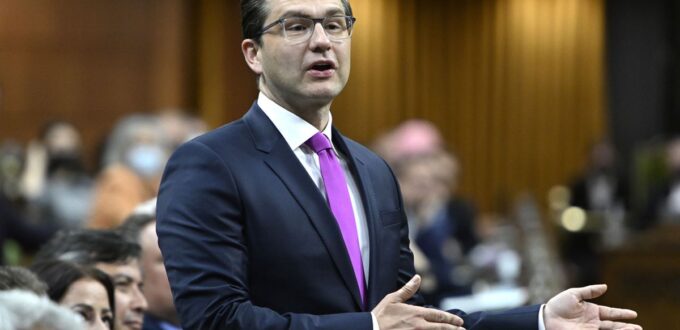:format(jpeg)/cloudfront-us-east-1.images.arcpublishing.com/tgam/3UZNZ3FIYRPQBE6CWM5UT3X3QE.JPG)
Conservative MP Pierre Poilievre rises during Question Period in the House of Commons on Parliament Hill in Ottawa on June 15.Justin Tang/The Canadian Press
From the moment he entered the race to become the next leader of the Conservative Party of Canada, Pierre Poilievre has been up front about the job he really wants.
“I’m Pierre Poilievre and I’m running to be prime minister,” he says in campaign videos. Becoming the new leader of the CPC would be a mere stop along the way.
Yes, prime minister is the job he wants, with all the attendant seriousness and responsibility the position demands. But since the outset of his campaign, Mr. Poilievre has mostly invited questions about his judgment and suitability for such an office with a series of bizarre policy pronouncements. Somehow, he hasn’t really had to answer for many of his more outlandish positions, such as his vow to fire the Governor of the Bank of Canada.
However, he can and should be questioned today about his enthusiasm for, if not outright promotion of, cryptocurrency.
Earlier this spring, Mr. Poilievre made headlines when he praised the controversial digital-money system. It was the answer for Canadians who wanted to “opt out of inflation,” he claimed. After all, he was a bitcoin investor himself.
The presumptive favourite to win the CPC leadership has been much quieter about cryptocurrency these days. I wonder why?
Perhaps it’s because the crypto world is imploding, just as Warren Buffett and his partner, Charlie Munger, had suggested it might. Two of the history’s greatest and most profitable investors have been down on bitcoin and the cryptocurrency industry almost from its inception. Mr. Buffett famously said he wouldn’t pay US$25 for all the bitcoin in the world. Mr. Munger was even more condemning, saying that in his life he tried to avoid doing anything that was evil, stupid and made him look bad in comparison to others: “Bitcoin does all three,” he said.
The paranoid style in Conservative politics has deep roots
Pierre Poilievre’s good fortune: His supporters don’t see his hypocrisy
This week, Microsoft co-founder Bill Gates said cryptocurrency was based on the “greater fool theory.” This is the notion that investors can make money on something relatively worthless, as long as there are people willing to bid higher for it.
Recent crypto losses have been estimated to total as much as US$1.5-trillion. The value of Bitcoin continued to tumble this week, with trading down as much as 8 per cent to around $20,000. In November, it was trading at almost $65,000. The total value of the cryptocurrency market has dropped by 65 per cent since last fall, and many analysts believe the floor underneath it is still collapsing.
One concern amid all this is the possibility that many Canadians bought what Mr. Poilievre was selling earlier this spring. And why would that be a stretch? The man, after all, is “running to be prime minister.” Surely, he wouldn’t recklessly promote something that was inherently risky.
I understand the allure Mr. Poilievre holds to many disenfranchised people out there, with his spectacular promises to get rid of the so-called “gatekeepers” allegedly ruining the lives of so many. Gatekeepers such as the Bank of Canada, which Mr. Poilievre regularly trashes. But the same gatekeeper, it turns out, did issue cautions about this very situation.
Who looks stupid now, Mr. Poilievre?
Some people are suggesting that the crypto crash is no different than the overall stock market crash. That may be the case, but if Mr. Poilievre had been hard-selling a stock that disintegrated in value, we would expect him to be held accountable. We would anticipate he would articulate just how he felt about the possibility that Canadians were seduced by his warm embrace of a particular product, plopped money down to buy it and were now facing excruciating financial losses as a result.
The reality is that much of the crypto industry appeared almost overnight, built on a foundation of dreams and wishes and fairytale dust. Hollywood actors such as Matt Damon urged people to buy in with catchy slogans such as “fortune favours the brave.” Of course, it doesn’t matter to Hollywood celebrities that the entire business model largely looks like a Ponzi scheme.
The crypto promoters bragged about never being governed by watchdogs. It sounds wonderful, until you realize this makes the industry rife for fraud, scams and general abuse.
Mr. Poilievre has said that as prime minister, he would normalize cryptocurrencies to “decentralize” the economy and reduce the influence of gatekeepers such as the central bank. He hasn’t said what he’d do if the industry collapsed in the meantime.
The man who would be prime minister needs to be asked a few hard questions about his crypto fascination – and what it says about the kind of judgment one needs to hold the most difficult job in Canada.
Keep your Opinions sharp and informed. Get the Opinion newsletter. Sign up today.

No Comments Yet